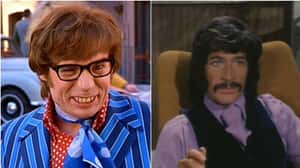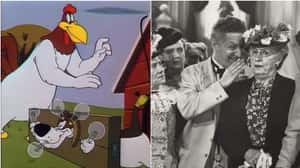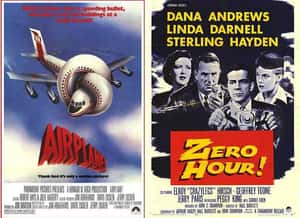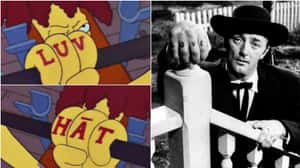Parodies That Are Way More Popular Than The Thing They're Parodying

120.7k views 13 items
What happens when popular parodies stop being parodies? Do parodies more popular than their subject cease to be funny, or are they just funny in a different way? If you didn't know about the movie Downfall, for example, would all of those Downfall Hitler memes still be funny?
It's a tricky question. It doesn't happen very often, but there are a few examples of this weird phenomenon. Most parodies "punch up," so-to-speak, poking fun at politicians, films, songs, companies, and so on, that a lot of people are familiar with. Long after everyone has forgotten, for example, a Saturday Night Live sketch mocking a presidential candidate, that candidate is remembered by the public for their life and deeds beyond the sketch.
But sometimes, the parody becomes way more popular than the source material, creating a new, rare class of parody: "Things You Didn't Realize Were Parodies." Do these parodies suffer for being so anchorless? Is David Bowie's "Magic Dance" a weaker, less-clever song? Is the Energizer Bunny any less iconic? Let's explore some examples of parodies that occupy this odd space in popular culture.
Austin Powers VS Jason King

The Austin Powers trilogy is obviously a James Bond parody in part, with its references to Goldfinger (Goldmember), Oddjob (Random Task), and Pussy Galore (Alotta Fagina), among many, many others. But the Austin Powers character himself was actually inspired by an obscure womanizing detective/spy character named Jason King (Peter Wyngarde), from a short-lived 1970s British spy show of the same name. King shares with Powers a love for bleeding-edge trendy clothing, bouffants, untamed body hair, and shameless flamboyance. The character's legacy reached far beyond Powers: King also inspired the 1990s Invisibles comic book character Mr. Six and the X-Men villain Jason Wyngarde, also known as Mastermind.
Foghorn Leghorn VS Beauregard Claghorn

Most kids and cartoon fans probably assume the loudmouthed southern rooster Foghorn Leghorn is a Looney Tunes original, but he's actually a parody of/homage to two 1940s radio characters: Senator Beauregard Claghorn, an uber-Southern politician character played by Kenny Delmar on The Fred Allen Show, and The Sheriff, a hard-of-hearing Southern lawman played by Jack Clifford on a show called Blue Monday Jamboree. When Leghorn debuted in 1945, he was unnamed and based only on The Sheriff, since the Claghorn character had yet to debut. By the early 1950s, however, only the influence of the Claghorn character remained and he took on the Foghorn Leghorn name, a direct reference to Claghorn. The popular Claghorn character even appeared on the silver screen in 1946's It's a Joke, Son, the title of which went on to become one of Foghorn Leghorn's catchphrases.
'Airplane!' VS 'Zero Hour!'

Airplane! was the 1980 hit and cult classic starring Leslie Nielsen, and is considered one of the best comedies of all time. It was a direct satire on a lesser-known (though well-recieved) disaster drama called Zero Hour! which premiered in 1957.
Filmmakers David and Jerry Zucker and Jim Abrahams wanted to poke fun at the disaster film genre by turning tragedy into slapstick comedy. They drew from Zero Hour! and other films like it, sometimes creating almost identical scenes from the originals.
LOVE/HATE Tattoo Jokes VS 'The Night Of The Hunter'

Jokes about having some variation of LOVE/HATE tattooed on your knuckles are incredibly common, but their origin is somewhat obscure. When the three-fingered Sideshow Bob on The Simpsons sported "LUV" and "HĀT," for example, or when a dog at the pound in Shaun the Sheep: The Movie had "BARK" and BITE" on its forepaws, it isn't just a reference to a common prison tattoo. Robert Mitchum's serial killer preacher character Harry Powell first wore the distinctive LOVE/HATE tattoos in 1955's The Night of the Hunter, where Powell would use them in unsettling impromptu "sermons" about "the story of good and evil." In 1996, Roger Ebert called the movie "one of the greatest of all American films" but lamented how it "has never received the attention it deserves."
Sent from my iPad
No comments:
Post a Comment
feel free to leave a comment or two